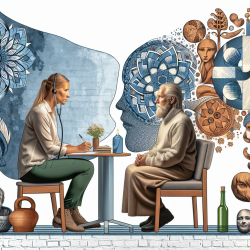Introduction to Dignity Therapy
Dignity Therapy (DT) is a therapeutic intervention designed to help patients, particularly those in palliative care, to reflect on their lives, document their experiences, and leave a meaningful legacy for their loved ones. Originally developed in English-speaking countries, DT has shown promise in enhancing patients' sense of dignity, reducing suffering, and improving their overall quality of life.
Adapting Dignity Therapy for Danish Culture
The research article "Testing the feasibility of the Dignity Therapy interview: adaptation for the Danish culture" explores the adaptation of DT for Danish patients and healthcare professionals. This adaptation was necessary to account for cultural differences in communication styles, healthcare practices, and societal values.
Key Findings and Recommendations
The study involved interviews with healthcare professionals and patients to assess the feasibility and acceptability of DT in Denmark. Here are some key findings and recommendations for practitioners:
- Comprehensibility and Relevance: DT was found to be comprehensible and relevant to Danish patients, although some adjustments were necessary to align with cultural norms.
- Existential Concerns: While professionals were initially concerned about the existential nature of some questions, patients generally did not find them distressing. Practitioners should be sensitive to individual patient needs and adjust the language accordingly.
- Cultural Sensitivity: Danish patients were less comfortable with self-praise and discussing personal accomplishments. Practitioners should approach these topics with cultural sensitivity, using language that resonates with patients' values.
- Therapist Training: Training for therapists is crucial to ensure they can navigate cultural nuances and facilitate meaningful conversations. This includes understanding when to gently introduce or avoid certain topics.
Encouraging Further Research and Practice
For practitioners looking to enhance their skills, this study highlights the importance of cultural adaptation in therapeutic practices. By understanding and integrating cultural differences, practitioners can improve patient engagement and outcomes.
Practitioners are encouraged to conduct further research and consider how DT can be adapted to other cultural contexts. This not only enriches the therapeutic process but also broadens the applicability of DT across diverse populations.
Conclusion
The adaptation of Dignity Therapy for Danish culture demonstrates the potential for therapeutic interventions to be tailored to meet the unique needs of different cultural groups. By embracing cultural sensitivity and flexibility, practitioners can provide more effective and meaningful support to their patients.
To read the original research paper, please follow this link: Testing the feasibility of the Dignity Therapy interview: adaptation for the Danish culture.










